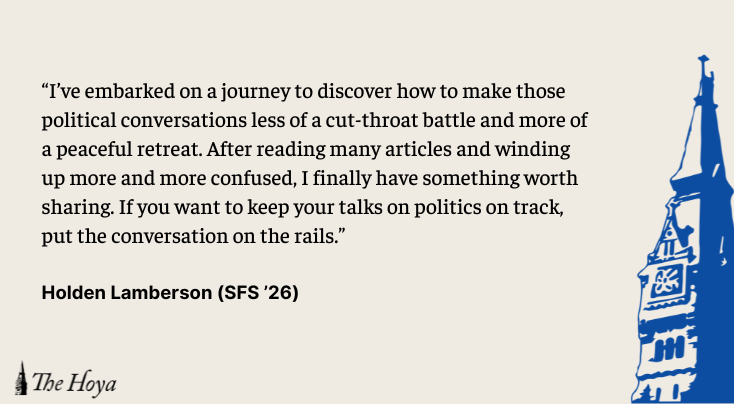We’ve all had those talks — the ones that drift into politics like a ship getting sucked into a whirlpool. Everything is so peaceful, and all of a sudden, a conversation about the presidential election jumps out from behind the bushes with a knife in its hand.
Discussions like these are all too common — and it’s not because we talk politics too much but because those discussions have become incredibly difficult to avoid in an increasingly polarized United States.
Georgetown University is no exception — with a politically minded student body located in our nation’s capital — contentious conversations can and do arise.
Amid all this anxiety about partisanship, I’ve embarked on a journey to discover how to make those political conversations less of a cut-throat battle and more of a peaceful retreat. After reading many articles and winding up more and more confused, I finally have something worth sharing. If you want to keep your talks on politics on track, put the conversation on the rails.
The idea is rather simple, and it only has two rules: set the topic and don’t let the discussion get personal.
Setting the topic is relatively self-explanatory.
When those classic holiday dinner conversations inevitably shift from how great the food tastes to whom Uncle Joe supports in an upcoming election, limit the discussion to one’s stance on specific topics, such as immigration and the debt ceiling. If you don’t specify the conversation, people will attack each other and latch onto whatever bits they love or hate. And, of course, we all end up talking right over each other.
I know this experience all too well.
At home, my family runs the gamut from one side of the political spectrum to the other, and eventually, Christmas dinner turns into Trump this and Biden that. Clamors about climate change and shouts about immigration and the military are nothing out of the ordinary.
The conversation may have started with a joke, but it rarely ends with one. With everyone talking about something different, the simple discussion has morphed into a 14-way lecture, where you can practically watch people getting hot-headed with a thermometer — an unmitigated disaster.
Even at Georgetown, these types of “arguments” are not rare — from clubs to discussion groups, these examples of discourse are pervasive.
Setting the topic — even casually in the middle of a conversation — can help avoid these kinds of messes, as it forces people to listen to each other, helping to foster understanding. It can also help to close gaps in perception and to limit the use of the straw man fallacy — the act of exaggerating and mischaracterizing an opposing argument to make it easier to attack.
The second step to putting a political conversation on the rails is to not let things get too personal.
This means moving away from heart-wrenching stories and anecdotes that appeal to your sense of right and wrong. What appeals to your moral compass may differ from what appeals to someone who disagrees with your politics.
Disagreements over morals tend to be yes or no arguments. Someone has to be right, “the victor,” and someone has to be wrong, “the monster,” turning what should be an impersonal topic into a potential verbal skirmish.
Instead of letting values clash and voices rise, talk about the pros and the cons. Ground the topic in specific results, whether it is GDP growth, wages or inflation, which everyone can generally agree are either good or bad. Distancing the conversation from the emotionally charged nature of the topic can make it less likely that sparks will fly.
Some may say a strategy like this limits discussion and removes empathy, which may be true. But in my experience, any conversation that reaches a conclusion is better than the alternative. Be it at Georgetown or in our homes, we should use more difficult, but productive, frameworks for conversation.
Holden Lamberson is a sophomore in the School of Foreign Service.














